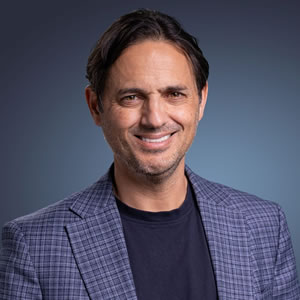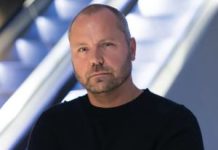Denis Phares Podcast Transcript
Denis Phares joins host Brian Thomas on The Digital Executive Podcast.
Welcome to Coruzant Technologies, Home of The Digital Executive Podcast.
Brian Thomas: Welcome to the Digital Executive. Today’s guest is Dr. Denis Phares. Dr. Denis Phares leads with a passion for making the planet more sustainable. As the President and chief executive Officer of Dragonfly Energy Corporation, he focuses on developing revolutionary technologies that will change the way we store and harness renewable energy.
As a visionary leader, Ferris has helped grow dragonfly energy in its brand battle borne batteries into one of the leading. Lithium-ion products in the market while also leading a world-class r and D team in the advancement of groundbreaking technologies and manufacturing processes. Well, good afternoon, Dennis. Welcome to the show.
Denis Phares: It’s great to be here.
Brian Thomas: Absolutely, my friend. I appreciate it. You’re hailing out of Reno, Nevada. Today. I’m in Kansas City, so just a couple hours apart, but I know sometimes it’s hard to get on a call and make something when the time zones can be a challenge. So, appreciate that. And Dennis, jumping into your first question, after a distinguished tenure as a professor at USC with deep expertise in energy, nanotechnology, and fluid mechanics, what prompted your decision to leave academia in 2012 and found dragonfly energy?
How did your academic background shaped Dragonfly’s innovative direction?
Denis Phares: Dragonfly Energy is a technology company, so my background obviously as a, as an engineering professor is technology heavy. And I was always working on issues related to energy from a climate standpoint, from a device fabrication standpoint.
And so as I was developing technologies, I kind of learned about. Patents and how to file patents and sort of the interaction between academia and commercializing patents. And I decided that the most impactful way for me to move forward if I was bringing new technology into the world was to do it through my own company.
So that was really the, the impetus. And initially I actually started. Company, a couple actually as a professor, and then realized that it was really difficult to do both well, and so I took the step of leaving a tenured position and. Going full speed into business, and I wanted to do it right, so I did get an MBA and founded Dragonfly Energy, which was really focused on a way to produce lithium-ion battery cells in a very efficient manner using the the technology that I’d been working on for decades.
Brian Thomas: Love the story and the backstory is usually how these podcasts start. So, I appreciate that. You know, developing technologies as an engineering professor is pretty cool, but you are absolutely right. And I’ll just kind of repeat what you said is the most impactful way to bring that new tech or make the world a better place, right, is by having control of it.
Having a company leading that charge and, and bringing those solutions again to the world. So, I appreciate that. And Dennis, under your leadership Dragonfly Energy and its battle-borne batteries brand have become leaders in the lithium-ion market, especially in RV marine and industrial off-grid applications.
How have you balanced r and d manufacturing and brand growth to achieve this status?
Denis Phares: Uh, that’s a great question ’cause it’s pretty unique for a technology company to really focus on going to market with a brand and. After getting an MBA, one of the first things that I wanted to do in terms of starting a company was making money.
After all, that is the point of a company and tech companies, often, especially hard tech companies, they, they tend to overlook the fact that. The focus really should be on revenue rather than just going out and trying to get capital. That’s a less risky way to run a tech company. So yeah, we went to market early on.
We established the battle borne batteries brand. And we looked at various industries that we felt could really benefit from lithium ion battery technology. And the one that really percolated to the top early on was the RV market, where RV owners really did not like their lead acid batteries. We offered an alternative whereby they could really.
Change the way they use their rv. It really could be a more of an off grid activity rather than having to drive to, you know, a national park where you have to plug into a pedestal and run all your appliances. So when we brought battle borne batteries to market, we really revolutionized an industry, which is a great way for a tech company to get started.
Not only did it make us profitable, but it allowed us to fund the lithium-ion battery manufacturing processes that we were. It’s developing and expand our patent portfolio and really made us a holistic lithium-ion battery technology company.
Brian Thomas: Thank you. Really appreciate that. And I liked how you said that your approach in coming to the market, you know it, you were kind of unique for a tech company to bring their market, come to the market with that brand, in your case, battle borne batteries and, but you revolutionized the market.
You offered something. What I took away from this was the RV market. You know, you offer them an alternative to the traditional batteries and I think that was important and obviously that. Caught on and, and is, is catching on. And Dennis Dragonfly Energy has developed a proprietary dry electrode cell manufacturing technology, and recently strengthened its protection through new intellectual property.
Why do you believe this approach is key to enabling domestic battery competitiveness? And what gives you confidence that it can successfully scale where others have struggled?
Denis Phares: Well, yeah, there’s a, there’s a couple things there. First of all, in order to be competitive while manufacturing domestically, you really need to innovate in the manufacturing space.
You really need to figure out how to make things more efficiently, more cost-effectively, because quite frankly, it’s just cheaper to make things. Elsewhere, especially in Asia, especially in China, you have cheaper labor, you’ve got less regulation, you’ve got more established infrastructure for manufacturing.
So if you want to compete while manufacturing domestically, you have to have some sort of step function change and improvement in how you manufacture. And that’s exactly what served as the basis of the technology that Dragonfly Energy was developing. Now, why do we think that we’re going to be successful at that?
It really has to do with the uniqueness of the company in that we established the brand, we established the market first. So when we are manufacturing cells domestically. We actually have a place to put those cells. We don’t have to go look for customers ’cause we’ve already found them. And in fact, we’re our own customer.
We assemble battery packs today and today we’re using [00:07:00] cells that we have to outsource. But ultimately when we are onshoring the production of the cells, we’re gonna keep the, the assembly process intact and then deliver. Fully American made battery packs to our existing markets. And I think that’s something that lithium-ion battery companies, especially technology companies outside of Asia, have really struggled with, is finding the offtake for their products before they spend the hundreds of millions of dollars to build a gigafactory.
And that’s, you know, there’s, there’s a long list of. Companies that have struggled trying to do it in that sequence. And I think what Dragonfly is doing is very much different and probably the right way to go about it because ultimately you get the offtake first, then you build the manufacturing plant and you know you’ve got a place to put your product.
Brian Thomas: Thank you. I think that’s important, a different perspective. Of course. I did highlight in order for you to be competitive in this [00:08:00] market at man manufacturing. You need to be able to innovate in this space. It’s important. Performance improvement is constant in this space as well, but I like what I also heard is you build out this strong brand initially, which helps solidify your customer base when products came off the line.
And the last thing that I thought was pretty neat was, you know, you are your own customer. And I think that’s pretty cool. Appreciate you definitely being a player in this space. And Dennis, the last question of the day. As of July, 2025, dragonfly reported a 23% year over year growth in Q2 sales and reducing its adjusted EED loss signaling progress towards profitability and operational strength.
Looking ahead, where do you see dragonfly in the next five years, particularly in terms of commercial adoption of your battery tech grid integration and impact on the renewable transition? Uh,
Denis Phares: first I’ll say that dragonfly is a history of profitability. You know, we’ve been profitable for years before the company became a public company, and.
As interest rates rose, the RV industry experienced a pretty significant post COVID correction. So one thing that’s really nice about being able to have a company that has revenue is that we can focus on revenue growth and start driving the profitability again. And that’s exactly what we’ve done over the last few quarters.
And now we’re seeing the benefits of that because we’re starting to grow into our core RV market while expanding into adjacent markets like heavy duty trucking, other industries that we know are ripe for our solutions. And now we’ve got a brand and a track record and a history of execution. So it really is important to have a functioning company when you’re doing technology because.
Not only does it allow you to stay alive as a technology company, but it allows you to grow the markets where you’re gonna ultimately sell your product when you’re making, when you’re onshoring production of the, of the core components like the lithium ion battery cells. So in the longer term, in the next five years, of course, we expect to be manufacturing our own cells.
That opens up a huge array of new markets that are more specifically dependent on domestic sources. Lithium ion batteries are well known to be manufactured, primarily overseas. So it’s an industry that has to be grown domestically. The infrastructure needs to continue to grow, and we’re actually in a great place.
We’re in the state of Nevada where we’re, we’re very proud of the infrastructure that we’re building here. There’s a lot of lithium in the ground here. The state government is very dedicated to what they call the lithium loop, the ability to take lithium out of the ground, produce cells, packs, and then recycle the lithium, and that’s all in the state of Nevada.
So we’re really proud to be part of this whole ecosystem.
Brian Thomas: That’s awesome and I’m glad that obviously you have the resources there in the state, but the state is making that easier for you to do that. But I did wanna highlight a couple things. As you mentioned, dragonfly has always been a profitable company, but this because of that, allows you to drive more revenue growth in what you’re doing and expand, and you are expanding beyond the RV space into the heavy equipment and transportation, as you mentioned.
But what I really like to hear, the last thing I’ll just say is you expect to be manufacturing your own cells in the coming years. And that’s great for onshore manufacturing and labor. As you know, there’s been a lot of controversy in the news about tariffs, et cetera, but I think in the long term, having a lot of our manufacturing back here in the States makes a lot of sense and I appreciate the fact that you’ll be part of that.
And Dennis, it was just certainly a pleasure having you on today and I look forward to speaking with you real soon.
Denis Phares: Thanks for having me on, Brian.
Brian Thomas: Bye for now.
Denis Phares Podcast Transcript. Listen to the audio on the guest’s Podcast Page.











